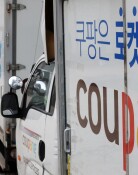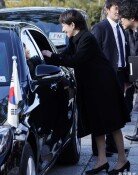`Legislators Spent Budget Lavishly on Foreign Missions`
`Legislators Spent Budget Lavishly on Foreign Missions`
Posted July. 04, 2009 06:06,
Legislators of the 18th National Assembly spent up to 74.62 million won (58,800 U.S. dollars), or a third of the 229.34 million won (180,700 dollars) in work facilitation budget paid by the parliamentary secretariat, to "encourage" Korean missions while traveling overseas.
The Dong-A Ilbo discovered this through an analysis of lawmakers` spending on work facilitation in 35 of their overseas tours between June 8 last year to Feb. 7 this year. This is the first time that lists of specific expenditures of work facilitation budgets have been made public. Legislators have been entitled to spend such funds freely while abroad.
Over the period, lawmakers spent 229.34 million won on work facilitation expenses. Including airfare, per diem and lodging expenses, they spent a combined 1.48 billion won (1.1 million dollars).
Payments made by lawmakers to foreign missions to help coordinate their schedules and for transportation fees are considered virtual presents paid with the national budget. As such, critics say the work facilitation budget for lawmakers must be managed more transparently.
○ 58,800 dollars spent on missions over 8 months
Twelve hundred dollars each to three ambassadors, 700 dollars for a consul general, and 500 dollars for a legislative officer. This is a list of expenditures for the work facilitation budget submitted by a veteran lawmaker who visited three European countries in late August last year along with his four colleagues.
He spent 5,500 of 16,400 dollars in the budget on the embassies, paying 1,200 dollars each to ambassadors when visiting each of the three countries.
By type of expenditure, dining costs accounted for 62,948 dollars and money spent on "encouraging" foreign missions reached 60,102 dollars. These items were followed by translation costs (12,748 dollars), gifts (12,419 dollars) and vehicle rentals (11,415 dollars).
Of the money paid to encourage foreign missions, 17,212 dollars was paid to ambassadors, 9,363 dollars to embassies, and 8,854 dollars to mission staff.
Such classification was reportedly based on lists of payments submitted by lawmakers. By amount paid to diplomats by rank, an ambassador got 500 to 1,200 dollars each; a consul 500 to 700 dollars; an embassy staff member 300 to 600 dollars; and a chauffeur 150 to 400 dollars.
In certain cases, the heads of trade offices and chiefs of ethnic Korean associations also got paid. There are no rules governing making payments for encouraging mission staff even in travel budget regulations.
Since there are no receipts for such expenditures, whether such payments were made cannot be confirmed. An official with the parliamentary secretariat said, We can get signed receipts for payment of service fees from translators, but how can we receive receipts signed by officials who took money from lawmakers to encourage them?
We have no choice but to recognize bills as suggested by lawmakers.
Even if lawmakers make false claims or exaggerate items in encouragement payments, no measures are in place to uncover such irregularities.
○ Loopholes in banquet and gift expenses
In a list of work facilitation expenditures submitted by lawmakers who visited the U.S. last year, no schedules were set for lunch or dinner. All meals were arranged with Korean missions overseas or ethnic Koreans.
In the work facilitation budget, the figure for banquet expenditures (62,948 dollars) is larger than that of encouragement payments, but such funds were also spent on ethnic Koreans and foreign missions.
The listing of gift expenses (12,419 dollars) is not transparent, either. Receipts for such payments are submitted to the parliamentary secretariat, but lawmakers are not required to specify the recipients. Though a lawmaker does not specify which gifts he bought, the office says nothing as long as he or she submits receipts suggesting the lawmaker spent the money on gifts.
○ Lawmakers ignore past rulings
Four ruling and opposition lawmakers spent three hours at a golf course in mid-August last year and had lunch together there while visiting Southeast Asia. How much they spent at the course and for what purpose remain unknown.
The parliamentary secretariat requires lawmakers to disclose a rough list of work facilitation expenditures, but due to privacy fears, keeps certification such as receipts that could show where they spent the money under wraps.
In 2004, however, the Supreme Court ruled that the Seoul mayor must disclose work facilitation expenditures in response to a civic complaint demanding the information.
Jeon Jin-han, secretary general of the Center for Freedom of Information and Transparent Society, said, The leader and deputy head of an organization are required to disclose expenditures for work facilitation budget, and related certificates and even store names must be disclosed in principle if money has been spent by a civil servant.
needjung@donga.com







